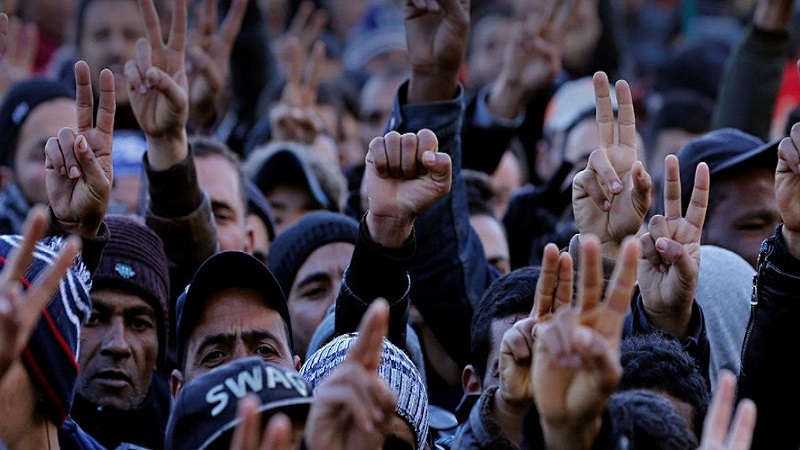It’s 10 Years Since the Arab Spring – So What?
Sat, 27 Mar 2021 14:00 - 15:00 Greenwich Mean Time (UTC±0)
Register here.
This panel discussion will review a decade of missed opportunities, ten years of change: the Arab Spring and what happened next
About this Event
At 11:30am on 17 December 2010, Mohamed Bouazizi poured a can of gasoline over his head and set fire to himself outside the governor’s office in a small Tunisian town. Bouazizi 26, earned his living by selling fruit from a cart which he pushed around the streets of Sidi Bouzid. He had been harassed for years by local police and municipal officials, who were extorting small sums of money from him. On the morning when he lit the match which caused him 90% body burns, his cart had been confiscated and he had been, allegedly, slapped across the face by a female municipal worker looking for a bribe.
Bouazizi’s desperate act of self-immolation triggered unprecedented protest and revolution in the Arab world, leading to the resignation and ousting of several leaders, including Muannmar Gadaffi and Hosni Mubarak, behemoths in the old Arab world, who had led their nations for a combined total of 72 years.
He was given several posthumous awards for his contribution to “historic changes in the Arab world”, accolades not usually expected by or bestowed on street vendors. But it was one of his sisters who, poignantly told Reuters in an interview in late 2011, “what kind of repression do you imagine it took for a young man to do that?” in her attempt to mitigate what happened next.
Reaction around the international community was mixed; some political leaders were unsurprisingly hesitant to comment, others did so in a standard diplomatic fashion. It was the Eritrean President Isaias Afewerki who first spoke in a less measured voice. He unequivocally blamed the US for a chaotic ME policy and openly criticised outside intervention in Tunisia, Egypt, Libya, Yemen. He also suggested that some of the protests were fuelled by the West and blamed the US and European governments for decades of toxic diplomacy. He went as far as to accuse the West of attempting create a new world order by manipulating organizations like the African Union and the Arab league into interfering with countries to the advantage of western countries
And it was the PM of Kazakhstan, Karim Masimov, whose words struck a real chord across the region when he tried to articulate why the same sort of thing wasn’t about to happen in his region: “What is the difference between them and us? The young people of Kazakhstan have hope, they can get a good education and they know they have opportunities to look forward to”.
A decade since Bouazizi’s suicide, those political resignations and as the ongoing conflicts in Libya, Syria and Yemen show little sign of resolution – do the young people of the region have any more hope?
We’re going to focus on the Maghreb during this panel discussion, with live contributions from North Africa.
The discussion will be chaired by Kathryn Kelly, a commentator and educational consultant who is based in the Moroccan capital, Rabat. Kathryn was based in Casablanca with the British Council in 2011 when there were several self-immolations and protests which went largely unreported in the international media. She was working in Tripoli when events deteriorated significantly, before being evacuated in March 2014 and spent time on assignments in Algiers, Cairo and Tunis 2010-2016.
Joining Kathryn will be following panellists:
Anna L. Jacobs is a non-resident fellow at the Arab Gulf States Institute in Washington and a contributor to the North Africa Policy Initiative. She is a Doha-based political scientist focusing on foreign policy in the Middle East and North Africa. She specializes in the politics of North Africa, global and regional power competition, U.S.-China relations, and U.S. foreign policy. Previously, she was the senior research assistant at the Brookings Doha Center, where she managed the center’s research and publications. Her own work focused on Chinese and U.S. foreign policy in MENA as well as governance and political economy in the Maghreb.
Her work has been published by the Brookings Institution, The Washington Post, Al Jazeera English, The National Interest, Jadaliyya, Muftah Magazine, and other outlets. She is a contributor to the edited volume The European Union and North Africa: Prospects and Challenges (Brookings Institution Press, 2019) as well as a forthcoming volume on China-North Africa relations.
Emna Mizouni is a Tunisian activist, journalist and digital communications specialist; she is a well-established commentator on issues ranging from open knowledge and culture to access to information and press freedom. In 2013, she co-founded Carthagina organization, an initiative designed to enhance understanding of Tunisia’s rich cultural heritage, both nationally and globally; Carthagina is proof of Emna’s invaluable contribution to Tunisia’s vibrant online profile, one of the continent’s and region’s most dynamic.
Emna served as the Curator of the World Economic Forum’s Global Shapers youth initiative; she is also a leader in the Wikimedia Movement’s Tunisian, Arab, and African communities, a role which saw her named as Wikimedian of the year 2019, at the Wikimania Conference in Stockholm. When Emna was appointed to the board of Access Now also in 2019, Brett Solomon the Executive Director commented: “Emna offers a deep understanding of how local communities are impacted by and responding to developments at the intersection of human rights and technology.”


